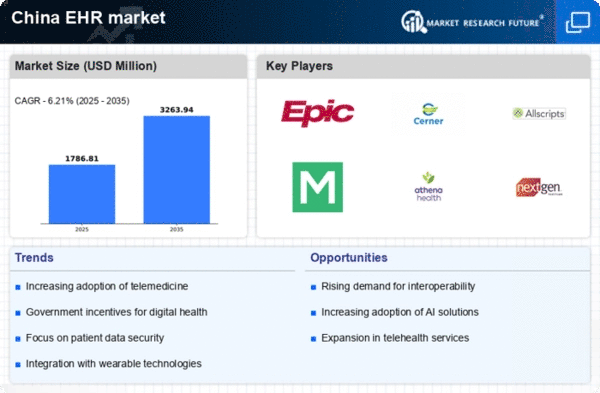Growing Aging Population
China's aging population is a critical driver of the EHR market. With over 250 million individuals aged 60 and above, the demand for efficient healthcare services is escalating. This demographic shift necessitates the implementation of ehr emr systems to manage chronic diseases and facilitate coordinated care among multiple providers. The market is expected to grow as healthcare facilities seek to improve patient outcomes through better data management and accessibility. Moreover, the government has recognized the importance of addressing the healthcare needs of the elderly, leading to increased investments in digital health solutions. Consequently, the ehr emr market is likely to expand as providers adapt to the complexities of an aging population.
Rising Demand for Telemedicine
The EHR market is significantly influenced by the increasing demand for telemedicine services in China. As healthcare providers expand their offerings to include remote consultations, the need for integrated electronic health records becomes paramount. Telemedicine platforms require seamless access to patient data, which necessitates the implementation of robust ehr emr systems. Recent studies indicate that the telemedicine market in China is projected to grow at a CAGR of 25% over the next five years, further driving the demand for efficient electronic health record solutions. This trend suggests that healthcare organizations must invest in ehr emr technologies to support telehealth initiatives, thereby enhancing patient engagement and care delivery.
Government Initiatives and Funding
The EHR market in China is experiencing a notable boost due to various government initiatives aimed at enhancing healthcare infrastructure. The Chinese government has allocated substantial funding to promote the adoption of electronic health records, with investments reaching approximately $1.5 billion in recent years. This financial support is designed to facilitate the transition from paper-based systems to digital solutions, thereby improving efficiency and patient care. Furthermore, the government's commitment to digital health is reflected in its policies, which encourage healthcare providers to implement ehr emr systems. As a result, the market is likely to witness accelerated growth, driven by both public and private sector collaboration in the healthcare domain.
Increased Focus on Patient-Centric Care
The EHR market is witnessing a shift towards patient-centric care, driven by changing consumer expectations and healthcare policies in China. Patients are increasingly demanding greater access to their health information and more involvement in their care decisions. This trend is prompting healthcare providers to adopt ehr emr systems that prioritize patient engagement and transparency. Recent surveys suggest that over 70% of patients prefer healthcare providers that offer digital access to their medical records. As a result, healthcare organizations are likely to invest in ehr emr solutions that enhance patient experience and satisfaction. This focus on patient-centric care is expected to be a key driver of growth in the ehr emr market.
Technological Advancements in Healthcare
The EHR market is being propelled by rapid technological advancements within the healthcare sector. Innovations such as artificial intelligence, machine learning, and big data analytics are transforming how patient information is managed and utilized. These technologies enable healthcare providers to derive actionable insights from electronic health records, improving clinical decision-making and operational efficiency. In China, the integration of advanced technologies into ehr emr systems is becoming increasingly prevalent, with many hospitals adopting AI-driven solutions to enhance patient care. This trend indicates a shift towards more sophisticated healthcare delivery models, which could further stimulate growth in the ehr emr market as providers seek to leverage technology for better outcomes.
















